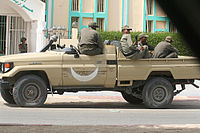2008 Mauritanian coup d'état
| 2008 Mauritanian coup d'état | |||||||
|---|---|---|---|---|---|---|---|
 Mauritanian soldiers in Nouakchott on August 7, following the coup. |
|||||||
|
|||||||
| Belligerents | |||||||
|
|
|
||||||
| Commanders and leaders | |||||||
|
Sidi Ould Cheikh Abdallahi (President of Mauritania) |
Mohamed Ould Abdel Aziz (General and the leader of the coup) |
||||||
A coup d'état took place in Mauritania on 6 August 2008 when Mauritanian President Sidi Mohamed Ould Cheikh Abdallahi was ousted from power by a group of high-ranking generals he had dismissed from office earlier that day.
General Mohamed Ould Abdel Aziz was one of the leading figures in the August 2005 coup that ended Maaouya Sid'Ahmed Ould Taya's 21 years in power. Aziz backed Abdallahi's candidacy in the subsequent March 2007 presidential election, which Abdallahi won. Abdallahi soon angered General Aziz and his supporters, however, by reaching out to Islamic hardliners, by freeing several suspected terrorists, and by using state funds to build a mosque on the grounds of the presidential palace.
In May 2008, Abdallahi appointed 12 ministers who had been part of President Taya's former government, some of whom had been accused of corruption. This, together with the inclusion of members of opposition parties in the government (headed by Prime Minister Yahya Ould Ahmed El Waghef) and the government's failure to present a programme, led many members of the pro-Abdallahi National Pact for Democracy and Development (PNDD-ADIL) party in the National Assembly to file a censure motion against the government on June 30, 2008. The government resigned on July 2 before a no-confidence vote was held, and Abdallahi immediately reappointed Waghef to form a new government. The government that was announced on July 15 included no members of the opposition; it also excluded the former associates of Taya whose presence in the previous government had attracted criticism.
On August 4, 2008, 25 of the 49 PNDD-ADIL deputies in the National Assembly, along with 24 of the party's 45 senators, announced that they were leaving the party, thereby depriving it of its parliamentary majority.
The immediate catalyst for the coup was Abdallahi's announcement on the morning of August 6 that he was firing several generals, including Aziz (who had been the head of the presidential guard) and army chief of staff General Mohamed Ould Sheikh Mohamed. Mauritania has experienced more than 10 coups or attempted coups since achieving its independence from France in 1960.
...
Wikipedia
